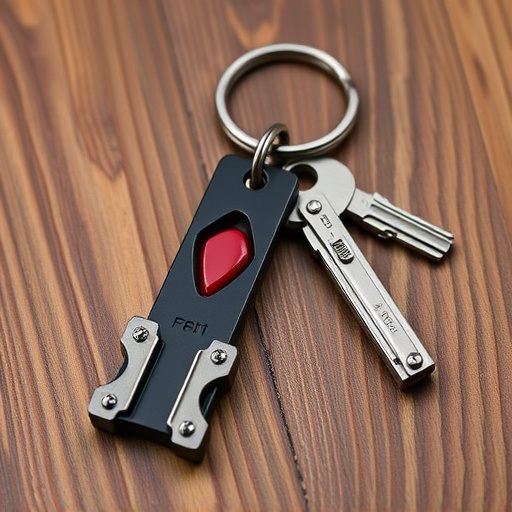Non-lethal keychain weapons like pepper spray and stun guns offer personal defense options, but their legality varies widely across US states. It's crucial to research local laws to ensure compliance and peace of mind. These devices, adhering to "non-lethal" definitions, include pepper spray, stun guns, and alarms, providing on-the-go security when allowed by law. Understanding age restrictions, permit requirements, and public safety measures is essential for legal carry and responsible self-defense.
“In today’s diverse legal landscape, understanding the permissibility of non-lethal keychain weapons for self-defense is crucial. This comprehensive guide explores state-specific regulations surrounding these compact defense devices, providing insights into their legality. From the safety of various non-lethal keychain types to best practices for responsible carrying, this article ensures you’re informed. Discover which states allow non-lethal keychain weapons and learn about key compliance factors, empowering you with knowledge in the event of unexpected situations.”
- Understanding Non-Lethal Keychain Weapons and Their Legality
- State-Specific Laws Governing Self-Defense Keychains
- Types of Legal Non-Lethal Keychain Devices
- Ensuring Safety and Compliance: Best Practices for Carrying a Keychain Weapon
Understanding Non-Lethal Keychain Weapons and Their Legality
Non-lethal keychain weapons, often referred to as personal defense tools or self-defense keychains, are compact devices designed for individuals’ protection against potential threats. These tools aim to incapacitate or deter attackers temporarily without causing serious harm. They come in various forms, including pepper spray, stun guns, and alarm-activated keychains. Understanding their legality is crucial for those considering carrying such devices for personal safety.
The legal status of non-lethal keychain weapons varies from state to state in the US. Some states explicitly allow their possession and use for self-defense, while others have stricter regulations or outright prohibit them. For instance, certain states require a permit or registration for stun guns or pepper spray, while some limit their use to specific situations, such as during emergencies or when facing an imminent threat. It’s essential to research and understand the local laws to ensure compliance and peace of mind.
State-Specific Laws Governing Self-Defense Keychains
Each state in the US has its own set of laws governing self-defense tools, including non-lethal keychain weapons. The legality and restrictions on carrying such devices vary significantly from one state to another. For instance, some states explicitly allow certain types of non-lethal keychain weapons as legal self-defense tools, while others have stricter regulations or outright ban their use.
Understanding these state-specific laws is crucial before considering the acquisition of a self-defense keychain. The specific laws cover aspects such as permitted force levels, age restrictions, and public carry regulations. Some states might only allow for personal defense in specific situations, like within one’s home or vehicle, while others may permit open carrying in public. Always check with your local authorities or legal experts to ensure compliance with the latest regulations regarding non-lethal keychain weapons allowed in your state.
Types of Legal Non-Lethal Keychain Devices
In the realm of personal safety, non-lethal keychain devices have emerged as a popular and convenient self-defense option. These compact tools are designed to provide users with a sense of security while on the go. When it comes to legal requirements, the definition of “non-lethal” is key. Such devices must be capable of causing pain or disability without resulting in permanent injury or death. This category includes various innovative products, such as:
1. Pepper spray keychains: These are a popular choice due to their effectiveness in incapacitating an assailant temporarily. They are easy to use and carry, allowing individuals to defend themselves against threats with just a quick spray.
2. Stun guns: Similar in concept to pepper spray but delivering an electric shock, stun guns are another legal option for self-defense. They can be attached to keys, making them readily accessible. The high voltage jolt can disable an attacker long enough for the user to escape or seek help.
3. Personal alarm keychains: These small devices emit a loud sound, often with flashing lights, to startle and deter potential attackers. They are simple yet effective, especially in situations where the user may be outnumbered or unable to fight back physically.
Ensuring Safety and Compliance: Best Practices for Carrying a Keychain Weapon
Ensuring Safety and Compliance: Best Practices for Carrying a Keychain Weapon
When it comes to self-defense, convenience is key, especially with non-lethal keychain weapons becoming increasingly popular. However, it’s crucial to understand the legal requirements and best practices for carrying such devices to ensure your safety and compliance with local laws. Different states have varying regulations regarding the use and carry of keychain weapons, focusing on factors like age restrictions, hidden carry permit requirements, and public safety considerations.
To stay within the law, familiarize yourself with your state’s specific rules. Ensure you are of legal age to possess a keychain weapon and obtain any necessary permits or licenses. Proper storage is equally important; keep your device in its case when not in use to avoid accidental activation and to comply with carry laws. Additionally, be mindful of your surroundings and respect private property rights, as public displays of keychain weapons can draw unwanted attention.
In light of the varying legal landscapes across states regarding non-lethal keychain weapons, understanding your local regulations is paramount. This article has explored the concept of self-defense keychains, their legality, and best practices for safe carrying. Different states have distinct rules on what constitutes a legal non-lethal keychain device, so it’s crucial to verify your state’s specific requirements. By adhering to these guidelines, individuals can ensure they remain within the law while empowering themselves with a convenient and accessible self-defense option. Remember, knowledge is key when it comes to protecting yourself, and being aware of your rights and responsibilities is a vital step in staying safe.
